The Book Truck: Delivering Literacy in Southern California
Why Do Some People Read?
For children in some communities, books and reading are omnipresent. Reading begins as amusement and entertainment and grows into a source of inspiration and comfort. In time, it becomes a potent, life-long passion that imparts information, knowledge, and power. In other communities, however, the lack of access to books and resources for readers results in less knowledge and confidence around books and lower literacy levels.
Low literacy is a fundamental barrier to achieving potential. For example, 40% of people who are unemployed are functionally illiterate. Among girls between the ages of 16-19, those with low literacy levels are three times more likely to become pregnant. Further, 70% percent of American prison inmates are unable to read above the fourth-grade level.

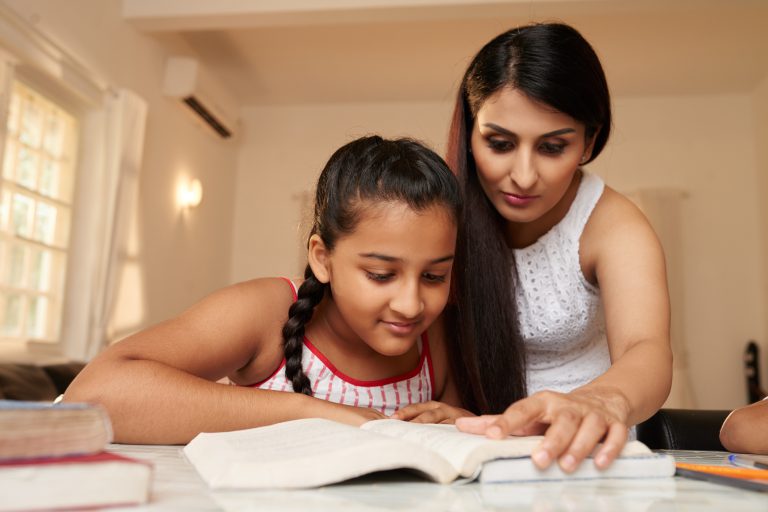

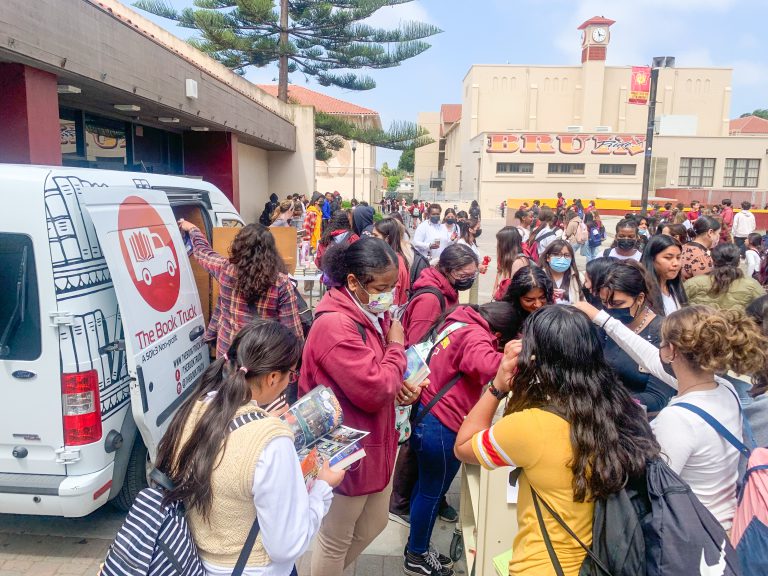
While most support for young readers focuses on the beginning of their reading careers, there is less attention and support given to older children. In Los Angeles County, there is an ongoing literacy crisis among teens. In the wake of the COVID pandemic, reading scores for 8th graders are dropping, especially among those from underserved communities. While reading scores have declined across the board, Black and Latino(a) teens from low-income households score much lower than their white, wealthier counterparts.
The visualization below shows the share of Los Angeles County students (across all grades) who have met or exceed standards on the English Language Arts (ELA)/Literacy portion of the California Assessment of Student Performance and Progress (CAASPP) standardized test prior to the pandemic (during the 2018-2019 school year) and after the pandemic (during the 2021-2022 school year). Across both time periods, deep disparities exist across student demographic groups. Fewer Black/African American, Migrant, Economically Disadvantaged, Hispanic/Latino/a and American Indian/Alaska Native students met or exceed standards than the average, while the reverse was true for Asian and White students. Furthermore, during the pandemic, test scores dropped for all students except those who identify as Asian, but the largest drops were seen among student groups who were already at a disadvantage. Standardized tests scores are an imperfect measure, and experts have pointed out that they have historically been instruments of racism and are likely biased towards white and economically advantaged students. However, they serve as one of the only available measures of important indicators like literacy among youth.
Recovering from these pandemic losses will take more time for certain groups. While it’s estimated that elementary-age readers will recover COVID learning losses in about three years, adolescents in underserved neighborhoods will take up to five or more years to recover from pandemic-related learning losses.
Access
Access to age-appropriate books and support is a problem for many teens. The average number of books in the home varies with socioeconomic status (SES), with lower SES readers often living in homes that have fewer books. Additionally, low-income neighborhoods frequently have fewer places to purchase or borrow books. These ‘book deserts’ further limit access to books for readers in these areas. Moreover, studies indicate that public libraries in low-SES communities are often under-resourced.
These factors combine to produce an environment with a shortage of age-appropriate, high-interest, diverse books for teen readers in these areas. This limited experience with the “right” books creates significant barriers to entry for certain groups who already may not have had reading skills modeled for them. The map below shows a population-adjusted measure of bookstore and library locations across Los Angeles County neighborhoods. Hover over a neighborhood to see the rate of library and bookstore locations per 100,000 residents in the neighborhood as well as the median household income.

Consequences
Teens living in book deserts who haven’t had book exposure and literacy support often lack both the aptitude and confidence required to navigate the wide-ranging array of books. In order to foster self-assurance, teens need to be taught competence, given age-appropriate material and autonomy of choice, and be provided with a sense of community around books. Without embracing teen readers with these policies, the lack of access and confidence ultimately begets a lack of motivation. Without the motivation to read, teens may never develop the literacy skills necessary to unlock a lifelong love of reading and all of the benefits that come with it. The consequence of low book saturation is often reflected in reading scores across the school spectrum. In Long Beach, in Census tracts where book saturation is low, kids score lower on elementary, middle, and high school English proficiency tests.
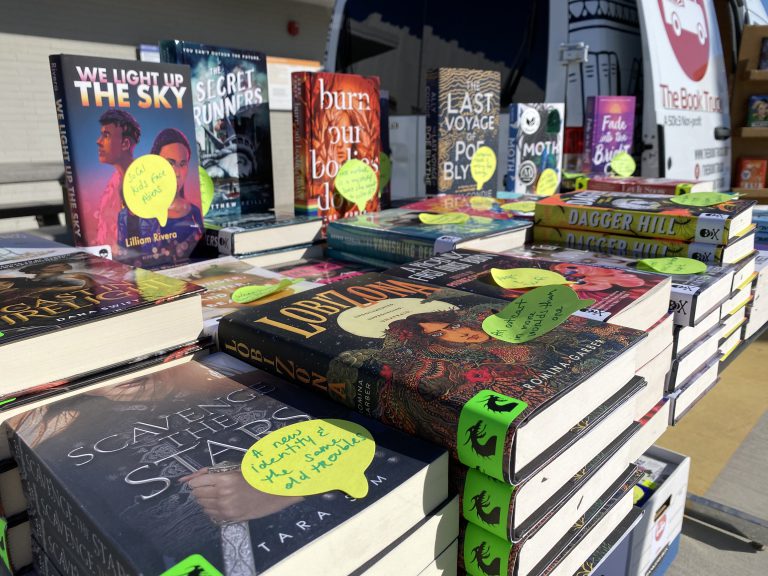
Solutions
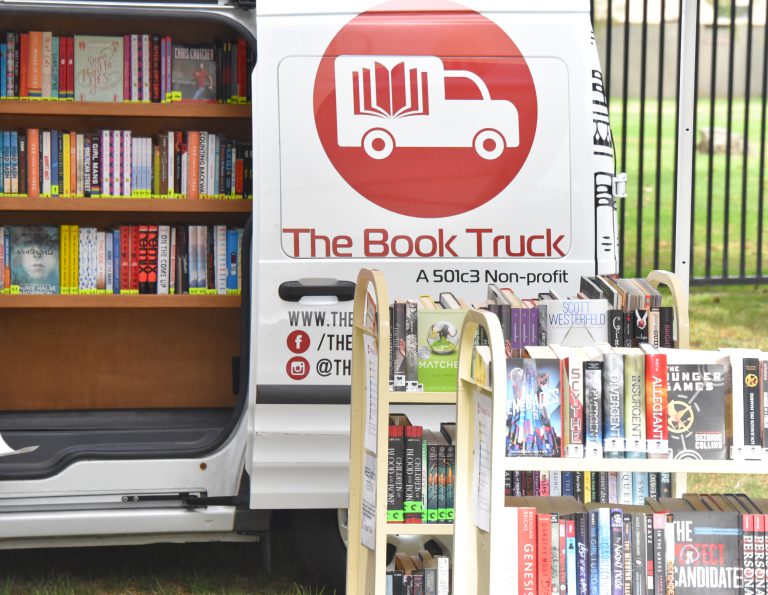
Based in Long Beach, and operating across LA County, the Book Truck aims to break the cycle that leads to low literacy rates caused by book deserts and looks to nurture the intrinsic motivation to read. The theoretical underpinnings of the Book Truck’s approach stem from Self-Determination Theory. Research around Self-Determination Theory indicates that outcomes improve with competence, autonomy, and relatedness. These three pillars work together to generate the social conditions for teen readers to flourish:
- Competence gives teens the dexterity to decipher and access the world of books, bookstores, libraries, and book culture.
- Autonomy provides teens the space and freedom to choose what they read. Curation is an important feature when it comes to giving teens autonomy of choice. The Book Truck collects surveys and feedback from peer volunteers who write personalized summaries and reviews about various titles so that they can deliver books that resonate with teen readers. Choosing a book from a litany of desirable options then becomes an empowering act. The focus isn’t on the sheer number, but on selecting a constellation of high-impact books: quality over quantity.
- Relatedness creates a culture and community around books. Teens can come together to discuss themes, attend events, and trade titles.
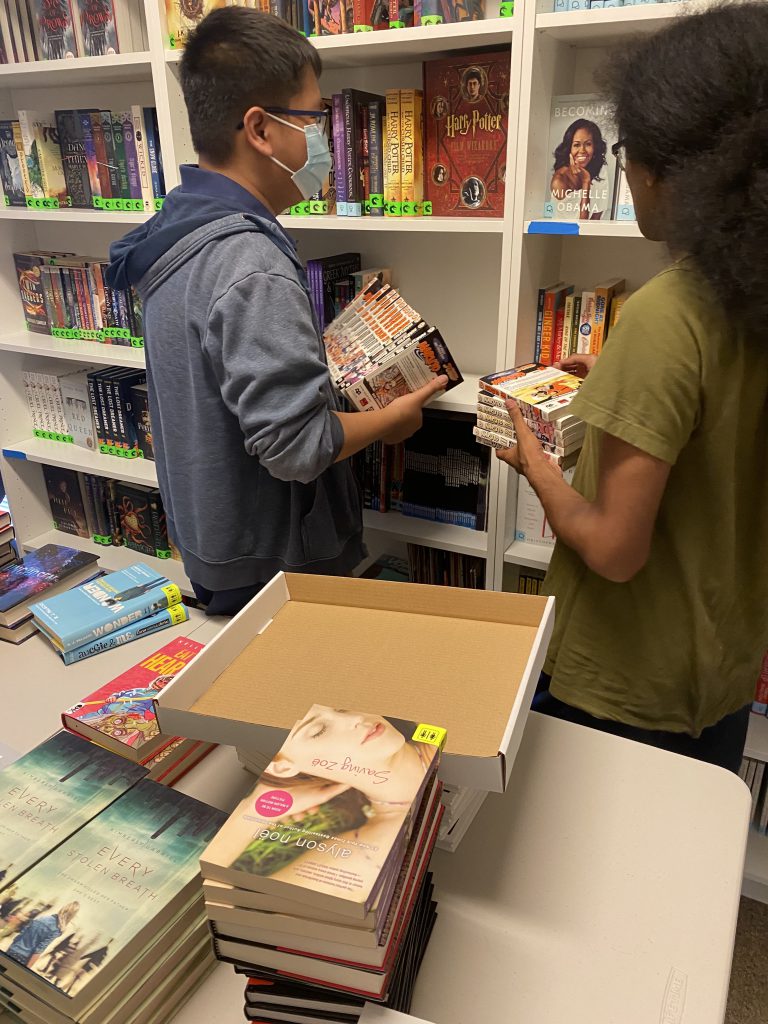
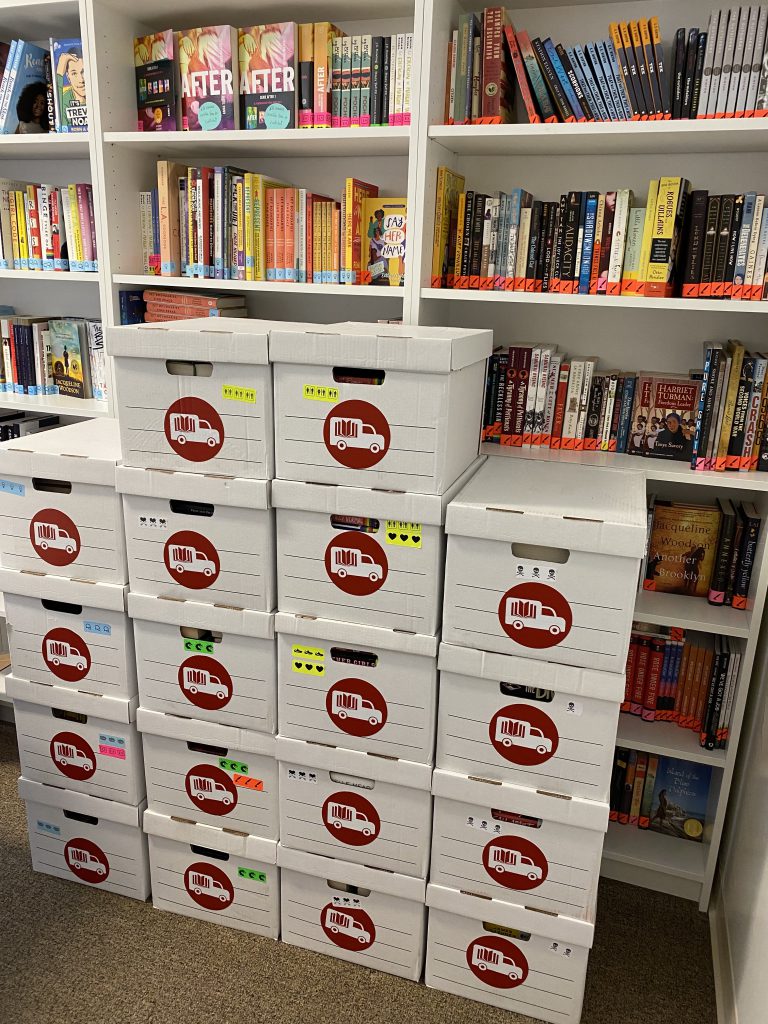
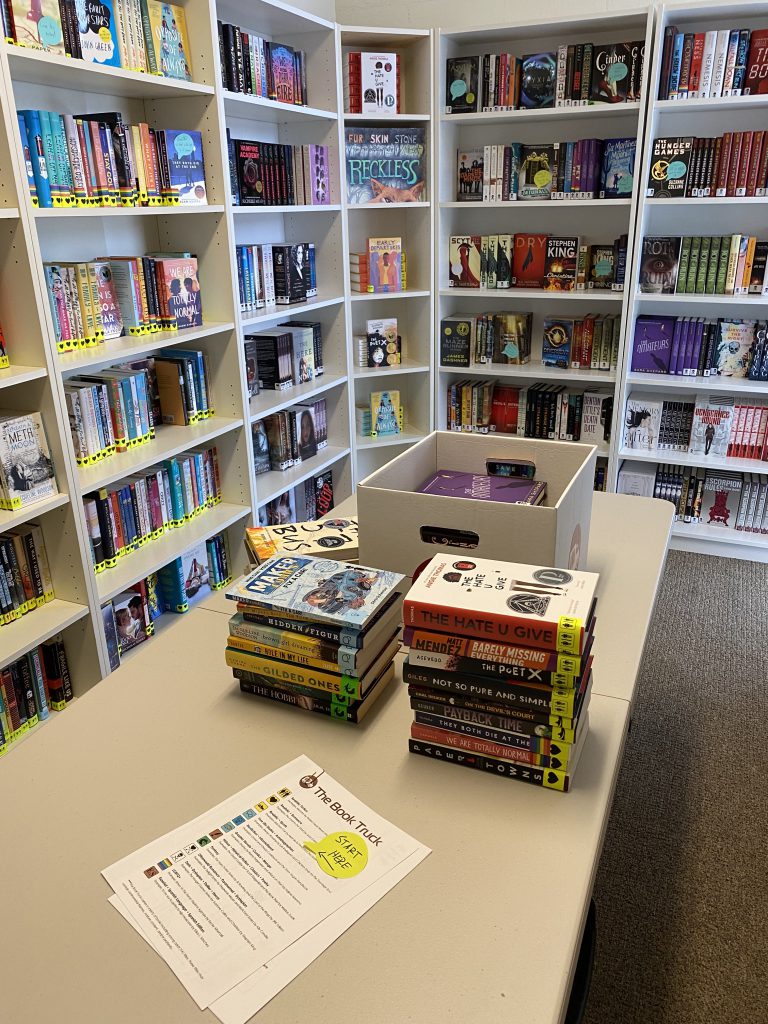
The Book Truck’s emphasis is on unhoused, foster care, and low-SES youth in Long Beach and the broader Los Angeles area. The organization’s outreach efforts include an array of services:
- The Book Truck traverses LA County and brings books to Title I high schools, community organizations, and fairs like the YALLWEST Book Festival.
- The Book Truck hosts literacy events across Los Angeles and donates thousands of books to teen readers in underserved communities every year. Events are staffed by volunteers hailing from local communities served by the Book Truck.
- The organization also packages “Lit Boxes” filled with curated, high-interest titles for delivery to various homeless, foster, and service organizations.
- The organization also sponsors “Lit Centers” that are housed within facilities and institutions that work with underserved teens and are stocked with a giveaway library.
The goal is to get the right books into the community so all books are provided to kids with no strings attached. Readers can return or exchange books at any time, trade them with friends, or keep them for themselves. The Book Truck hopes to instill not just the skills, but also a thirst for reading. It’s often just one book that can ignite a passion for reading and change the trajectory of a young person’s life. The Book Truck is working to provide that.
“Because of The Book Truck, now I’m a reader. I’m not sure I would have graduated from high school if it hadn’t been for them. When I volunteer and someone asks me about a book, I wonder, will I get to change that person’s life like the Book Truck changed mine?”
Johnathan M.

Dan Oberle
Dan Oberle is pursuing a Master of Urban Planning degree at The Price School. Prior to his arrival at USC, Dan worked as a documentary film editor in Los Angeles for many years. At USC he hopes to focus on housing and how the built environment influences cities as complex, social-ecological systems. He believes that design and data can be powerful tools to address the hidden inequities embedded in these systems. Dan holds a bachelor’s degree from Florida State University.

Stephanie Liem
Stephanie is a second year Masters in Public Policy student specializing in International Policy at the Sol Price School of Public Policy. She received her B.A. in 2020 from UC Berkeley, majoring in Global Studies with a concentration in Peace & Conflict. She is also a first generation Indonesian immigrant and Asian American activist whose activism revolves around challenging the Model Minority Myth and building Black and Asian solidarity. During the last two years, she worked as a grassroots organizer and Communications Director at an Oakland based non-profit called Hip Hop For Change. Here, she designed her very own Afro-Asian solidarity curriculum, which she has presented at schools, museums, events, and companies across the country. As an academic, her research interests are in ethnic conflict, Southeast Asian politics, and international governance.
Sources
American Public Health Association (APHA). (2012, October 31). Pre-teen literacy a strong predictor of pregnancy in U.S. teens. ScienceDaily. Retrieved May 11, 2023 from www.sciencedaily.com/releases/2012/10/121031081251.htm
Calefati, J. (2021, December 06). ‘This is a disaster.’: Severity of learning lost to the pandemic comes into focus. Politico. https://www.politico.com/newsletters/weekly-education/2021/12/06/this-is-a-disaster-severity-of-learning-lost-to-the-pandemic-comes-into-focus-799278?campaign_id=9&emc=edit_nn_20220104&instance_id=49344&nl=the-morning®i_id=78878467&segment_id=78602&te=1&user_id=bc14964dabd3b13ec41c41bc248be583
Deci, E. L., Ryan, R. M. (2017). Self-Determination Theory: Basic Psychological Needs in Motivation, Development, and Wellness. United States: Guilford Publications. https://www.google.com/books/edition/Self_Determination_Theory/GF0ODQAAQBAJ?hl=en&gbpv=1&printsec=frontcover
Neuman, S. B., & Celano, D. (2001). Access to print in low-income and middle-income communities: An ecological study of four neighborhoods. Reading Research Quarterly, 36(1), 8-26. https://doi.org/10.1598/rrq.36.1.1
Neuman, S. B., & Moland, N. (2019). Book Deserts: The Consequences of Income Segregation on Children’s Access to Print. Urban Education, 54(1), 126–147. https://doi.org/10.1177/0042085916654525
Rampey, B.D., Finnegan, R., Goodman, M., Mohadjer, L., Krenzke, T., Hogan, J., and Provasnik, S. (2016). Skills of U.S.
Unemployed, Young, and Older Adults in Sharper Focus: Results From the Program for the International Assessment of Adult
Competencies (PIAAC) 2012/2014: First Look (NCES 2016-039). U.S. Department of Education. Washington, DC: National Center for Education Statistics. https://nces.ed.gov/pubs2016/2016039.pdf
Rosales J. & Walker T. (2021). The Racist Beginnings of Standardized Testing. NEA Today. https://www.nea.org/nea-today/all-news-articles/racist-beginnings-standardized-testing
Siwierka, J.K. (2018). Eradicating Book Deserts: Teens’ Assessments and Perceptions of Book Access in Low-income Environments. Doctoral Dissertation. Wichita State University. https://soar.wichita.edu/bitstream/handle/10057/15426/d18023_Siwierka.pdf?isAllowed=y&sequence=1
Tadayon, A. (2022, July 26). Elementary Students Are Recovering Faster From Covid Learning Loss, Research Shows. LAist.
https://laist.com/news/education/elementary-students-are-recovering-faster-from-covid-learning-loss-research-shows?utm_campaign=20220726+LAist+Top+5&utm_medium=email&utm_source=sfmc_&utm_content=&utm_term=3766600
Photo Credits: All photos provided courtesy of The Book Truck and iStock photo.

